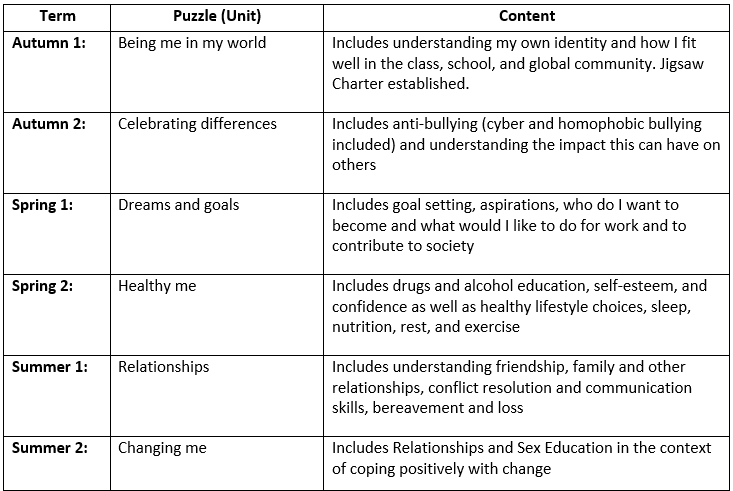PSHE
Opening the Mansfield GATE through PSHE
- Generate
Children acquire knowledge and generate an understanding that provides them with an opportunity to explore behaviours of themselves and others.
- Aspire
Children aspire by thinking critically and using information presented to them which challenges them to become good citizens.
- Together
Together children reflect on events from their lives and around the world to understand how important PSHE is in having a positive impact on themselves and the world today.
- Enquire
Children enquire using their thoughts and ideas about how they live in the world and understand change by using evidence and asking questions of themselves.
Our Vision
At Mansfield Primary Academy, we use a mindful approach to PSHE, which brings together Personal, Social, Health Education, emotional literacy, social skills and spiritual development in a comprehensive scheme of learning through our Jigsaw programme.
Each Puzzle starts with an introductory assembly, generating a whole school focus for adults and children alike.
Implementation
At Mansfield Primary Academy, we teach Personal, Social, Health Education as a whole-school approach to underpin children’s development as people and because we believe that this also supports their learning capacity. Lessons are sequenced and flashbacks are provided so that prior learning is considered and opportunities for revision of language and grammar and built in. The lessons are taught weekly and give the relevant context to build skills, attitudes, self-esteem, resilience and confidence, all of which need to be taught explicitly as well as nurtured implicitly, thereby demanding a well-structured, progressive lesson-a-week process.
The Jigsaw Programme offers us a comprehensive, carefully thought-through Scheme of Work which brings consistency and progression to our children’s learning in this vital curriculum area. The overview of the programme can be seen on the school website.
This also supports the “Personal Development” and “Behaviour and Attitude” aspects required under the Ofsted Inspection Framework, as well as significantly contributing to the school’s Safeguarding and Equality Duties, the Government’s British Values agenda and the SMSC (Spiritual, Moral, Social, Cultural) development opportunities provided for our children.

Lessons and resources help children to build on prior knowledge alongside the introduction of new skills. Whole-school opportunities are given e.g., weekly celebrations, music and songs, to reinforce the curriculum work and enhance the positive ethos of the whole school community, an effective whole school development tool. The rationale and philosophy underpinning Jigsaw resources is based on mindfulness philosophy and practice, sound psychology and is evidence-based. Jigsaw has structured lessons to maximise these processes. Children and young people are at the heart of all Jigsaw programmes to improve their capacity to learn, their resilience and emotional well-being and mental health and thereby enhance their life-chances.
PSHE is a non-statutory subject. However, there are aspects of it we are required to teach.
●We must teach relationships education under the Children and Social Work Act 2017, in line with the terms set out in statutory guidance
●We must teach health education under the same statutory guidance
●We must teach Relationships education and our governors have agreed that we will teach Sex Education.
●Our teaching must take due regard of the Equality Act 2011 This policy also complies with the terms of our funding agreement
Impact
Each lesson taught within the unit shows progression. However, the key element of this for school is knowing and being able to evidence the impact of the PSHE curriculum both on learners individually and in the school as a whole.
Regular discussions with pupils to evaluate and understand their skills and to understand exactly what the children feel is the impact on them of their learning.
As Jigsaw PSHE is a whole-school approach, rather than simply a lesson-a-week Scheme of Work for PSHE, there are numerous layers built in that engender a sense of belonging and community, and that value every individual, for example: praising one attitude or behaviour each week through the Weekly celebration and to sing the Jigsaw songs, and celebrating every child’s contribution to the school community through the 'end of Puzzle outcome’ (a display or whole-school activity that includes everyone’s involvement or work). The Jigsaw Families Programme outreaches the Jigsaw philosophy of positive psychology and mindfulness into the home too.
Much of the subject-specific knowledge developed through the Jigsaw approach equips pupils with experiences and understanding which will benefit them in secondary school, further education and future workplaces. We want to ensure that PSHE at Mansfield Primary Academy is loved by teachers and children across school, therefore providing children the building blocks that enable them to pursue a wide range of interests and vocations in the next stage of their lives.
